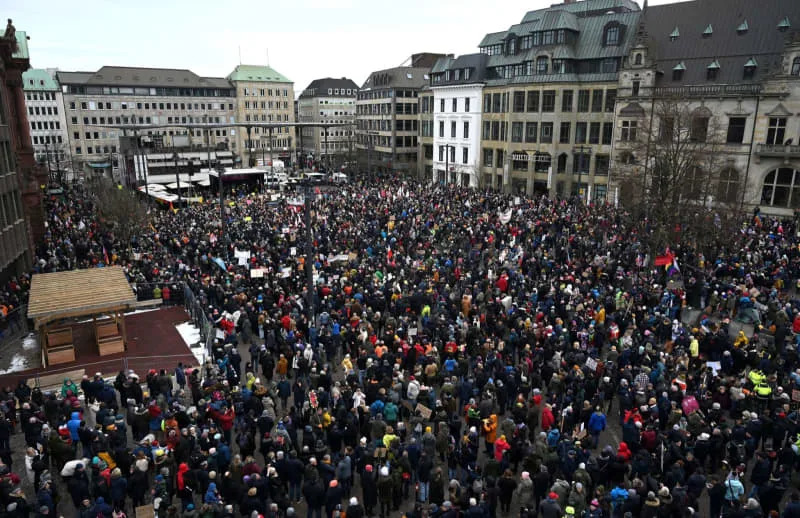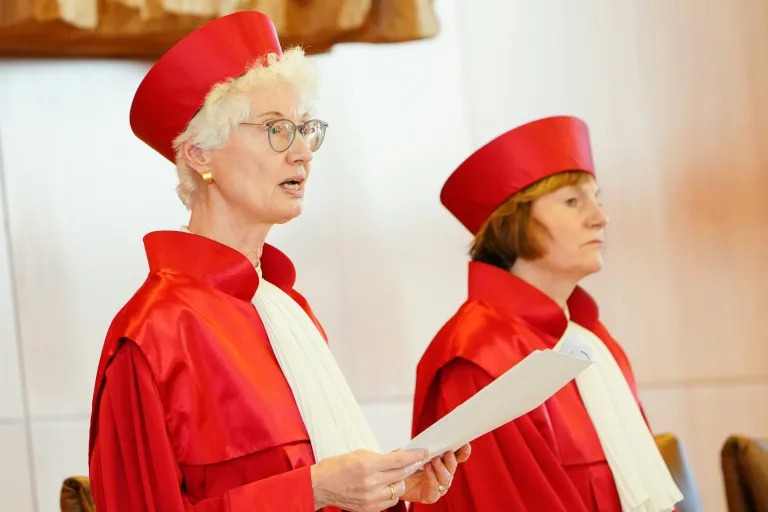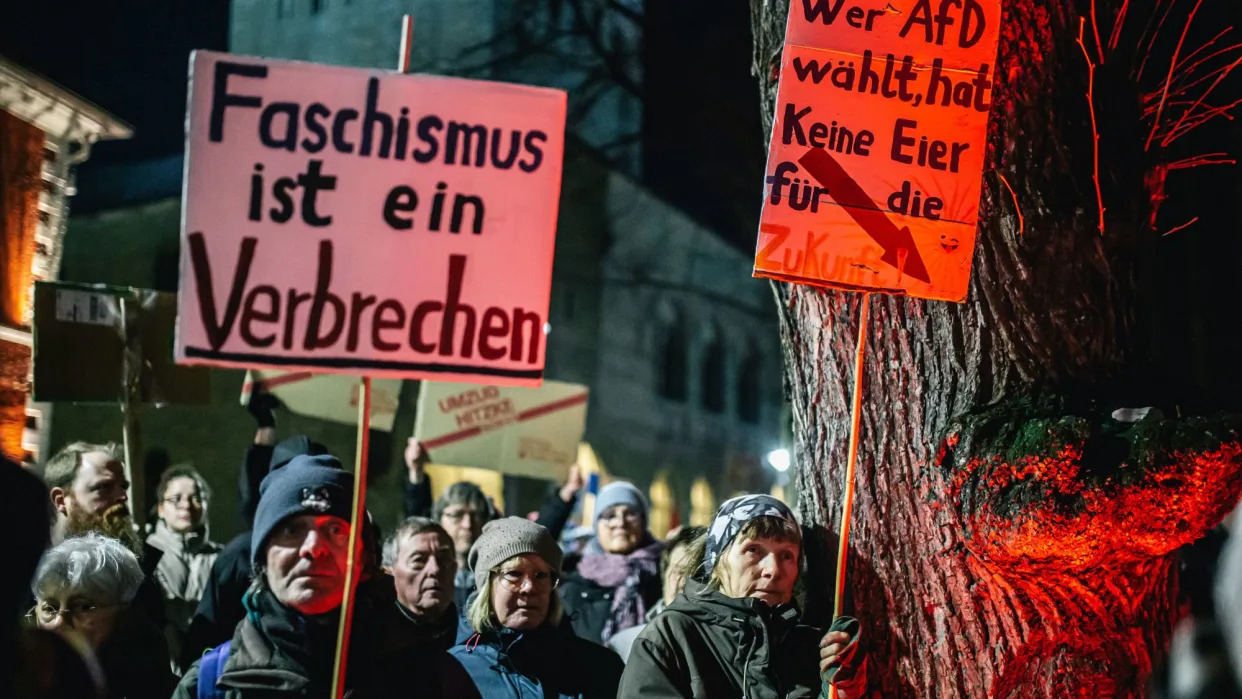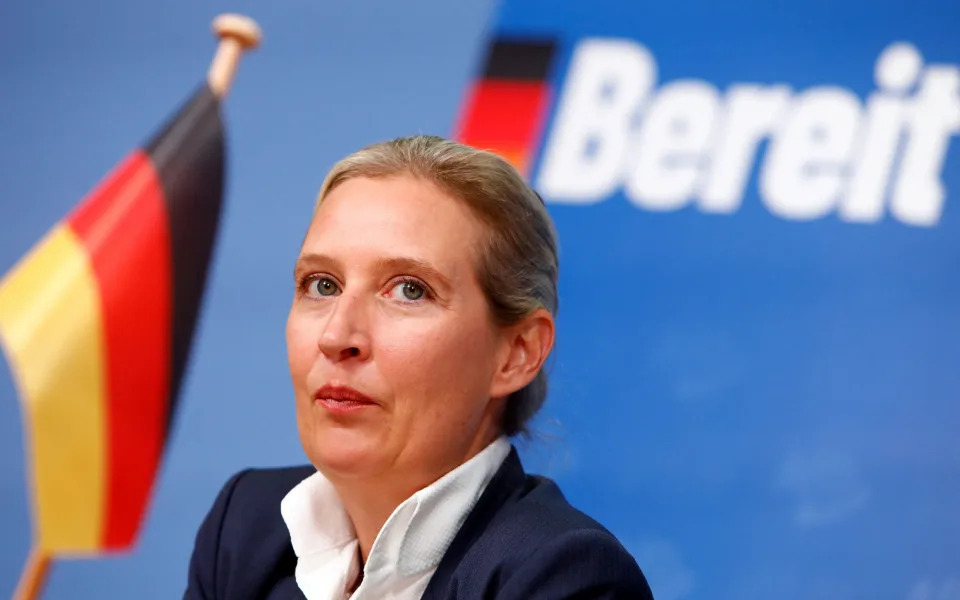Poll shows far-right AfD still second among German voters
DPA
Tue, January 23, 2024

Delegates walk up in front of the party logo at the AfD federal party conference at the Magdeburg Exhibition Center. A nationwide poll of German voters showed the far-right Alternative in Germany (AfD) remains in second place, although the party's support slipped slightly from the previous week. Carsten Koall/dpa
A nationwide poll of German voters showed the far-right Alternative in Germany (AfD) remains in second place, although the party's support slipped slightly from the previous week.
The weekly poll, conducted for the tabloid newspaper Bild by the INSA opinion research group and released on Tuesday, showed support for the AfD dropping from a previous high last week of 23% to 21.5%.
Despite the slight downward drop, the AfD has been on a clear upward trend in polls since mid-2022.
The party has recently been the target of mass anti-far right protests that attracted nearly a million demonstrators at the weekend in cities across Germany.
The protests follow revelations that some AfD politicians met secretly with far-right extremists in Potsdam in November to discuss plans to push immigrants out of the country, including some with German citizenship.
The conservative opposition CDU/CSU bloc remained the strongest party in the poll, at 30.5%, down about a half percentage point from the prior week.
Chancellor Olaf Scholz's Social Democrats (SPD) also lost a half percentage point, down to just 13.5%, while the Greens increased by roughly the same amount to 12.5%.
The liberal Free Democrats (FDP) remain at 5%, the threshold to receive seats in Germany's parliament, while the far-left Die Linke's slide continued, down another percentage point to just 3%.
Voters preferring various other parties increased sharply, from 8% to 11.5%, which may be due to growing support for the newly launched populist Alliance Sahra Wagenknecht (BSW), which was not listed separately in the poll results.
The survey polled a sample of 2,000 German voters between Friday and Monday. The poll has a margin of error of 2.5 percentage points.
Protests will not weaken far-right, says German firebrand politician
DPA
Tue, January 23, 2024

Thousands demonstrate against right-wing extremism on the market square in Bremen. The demonstrations are a reaction to research by the media collective "Correctiv", which uncovered that radical right-wing circles had met with AfD officials and a leading head of the far-right Identitarian Movement in Potsdam in November 2023.
Carmen Jaspersen/dpa
The leader of a new breakaway party in German politics, Sahra Wagenknecht, says she does not expect mass demonstrations to weaken the far-right Alternative for Germany (AfD) party.
"The AfD is strong not because there are suddenly so many voters with right-wing extremist views," the leader of the Alliance party told dpa in Berlin. "The AfD is strong because the politics in Berlin are so disastrous."
Police said more than 900,000 people took part in demonstrations against right-wing extremism across Germany last weekend.
The protests were triggered by revelations earlier this month from the Correctiv research centre about a meeting of right-wing extremists in November in Potsdam, near Berlin.
The meeting was reportedly attended by AfD politicians as well as members of the centre-right Christian Democratic Union (CDU) party, the conservative Values Union (WerteUnion) association, and far-right Identitarian movement.
According to participants, plans were discussed on how a large number of people of foreign origin in Germany, including asylum seekers, could be forced out of the country.
Wagenknecht said: "The demonstrations show that many people are worried when a party that has right-wing extremists and Nazis in its ranks becomes ever stronger."
"The federal government is responsible" for the AfD's strength, she said, as the government's "incompetence, aloofness and clientelism are rightly outraging people."
Wagenknecht split from the hard-left Die Linke party last year to form her own party, the Sahra Wagenknecht Alliance (BSW).
The leader of a new breakaway party in German politics, Sahra Wagenknecht, says she does not expect mass demonstrations to weaken the far-right Alternative for Germany (AfD) party.
"The AfD is strong not because there are suddenly so many voters with right-wing extremist views," the leader of the Alliance party told dpa in Berlin. "The AfD is strong because the politics in Berlin are so disastrous."
Police said more than 900,000 people took part in demonstrations against right-wing extremism across Germany last weekend.
The protests were triggered by revelations earlier this month from the Correctiv research centre about a meeting of right-wing extremists in November in Potsdam, near Berlin.
The meeting was reportedly attended by AfD politicians as well as members of the centre-right Christian Democratic Union (CDU) party, the conservative Values Union (WerteUnion) association, and far-right Identitarian movement.
According to participants, plans were discussed on how a large number of people of foreign origin in Germany, including asylum seekers, could be forced out of the country.
Wagenknecht said: "The demonstrations show that many people are worried when a party that has right-wing extremists and Nazis in its ranks becomes ever stronger."
"The federal government is responsible" for the AfD's strength, she said, as the government's "incompetence, aloofness and clientelism are rightly outraging people."
Wagenknecht split from the hard-left Die Linke party last year to form her own party, the Sahra Wagenknecht Alliance (BSW).
Far-right AfD could be next after German court defunds neo-Nazi party
Sebastien ASH
Tue, January 23, 2024

The court ruled the far-right Homeland party would be banned from receiving public funds (Uwe Anspach)
Germany's constitutional court on Tuesday approved a request to withdraw public funds from the neo-Nazi Homeland party, offering what one official called a possible "blueprint" for action against the far-right Alternative for Germany (AfD).
The verdict comes as Germany debates how to counter the rising popularity of the AfD, which is under close surveillance by domestic intelligence after being classed a "suspected case of far-right extremism".
Homeland, known until 2023 as the NPD, was "excluded from state funding for a period of six years", the court said.
In its reasoning, the court said Homeland sought to "eliminate the free democratic order" and had a "racist, in particular anti-Muslim, anti-Semitic and anti-Gypsy, attitude" that clashed with Germany's constitutional principles.
The neo-Nazi group would therefore lose access to state funding available to parties, as well as any tax breaks.
The ruling was a "confirmation of the pathway to not offering much space to the enemies of freedom", Chancellor Olaf Scholz told journalists.
"The forces that want to dismantle and destroy our democracy must not receive a cent of government funding," Interior Minister Nancy Faeser said.
The AfD currently sits second in national polls, and is leading them in several eastern regions where elections are set to be held later this year.
- 'Confirmed' extremist -
Markus Soeder, the conservative premier of the southern region of Bavaria, said ahead of the ruling that withdrawing funds from Homeland could be a "blueprint" for dealing with the growing threat from AfD.
Three of the party's regional branches -- in the eastern states of Saxony, Saxony-Anhalt and Thuringia -- are classed as "confirmed" extremist organisations for their efforts to undermine democracy and their anti-immigrant rhetoric.
Over the weekend, hundreds of thousands of people came out to protest against the AfD after its members were revealed to have discussed a mass deportation plan at a meeting with extremists.
The mooted mass deportation plan was "an attack on the foundations of our society", Faeser said.
"Right-wing extremism is the greatest extremist threat to our democracy -- and to people in our country," added Faeser.
Withdrawing public funding was "another instrument" to defend democracy, Faeser told journalists at a press conference, while refusing to rule out a similar move against the AfD.
Some government figures have urged caution, however, and warned against giving the AfD material for an anti-establishment campaign.
- Failed ban -
The challenge to the AfD needed to be "political", while any action should be limited to the "constitutionally necessary and possible", Finance Minister Christian Lindner told broadcaster Welt TV.
The parties of the "democratic centre" should not give the impression that they "want to use party law to fend off unwanted competition", Lindner said.
The request to exclude Homeland from state financing was made in 2019 by the German government, together with the upper and lower houses of the German parliament.
A previous attempt to ban the party outright in 2017 failed, when the constitutional court in Karlsruhe said the then NPD was not a real enough threat to be prohibited.
The German constitution was subsequently amended to introduce the possibility of withdrawing state funds.
Public money flows to any party in Germany that scores at least 0.5 percent in national or European elections, or one percent in regional votes.
Homeland, which was long a small but significant minority party under the NPD brand, has seen its following dwindle and dropped below the support threshold to be eligible for public funds.
But the party has still benefitted from tax advantages available to political parties, such as exemptions for donations.
AfD and the trouble with banning political parties
Arion McNicoll, The Week UK
Tue, January 23, 2024

Protest against the AfD.
More than 800,000 people took to the streets of Germany's major cities over the weekend to protest against Alternative for Germany (AfD), following reports that members of the right-wing party have been discussing a radical plan to expel millions of migrants.
Independent investigative news site Correctiv reported on a meeting of right-wing groups including the AfD and the centre-right Christian Democratic Union (CDU). They were planning "for the so-called remigration, or expulsion, of millions of people who have immigrated to Germany", said Deutsche Welle.
The story "jolted the nation awake from its winter slumber", said The Guardian, "triggering sackings and resignations" and "mass rallies across German cities".
It also prompted "a politically risky debate over an outright ban of the country's second-strongest party", the paper added.
'Coloured by the country's Nazi past'
Debate about potentially banning the AfD heated up when Saskia Esken, the co-leader of the ruling Social Democratic Party (SPD), said earlier this month that she was in favour of discussing a ban, if only, as she said, to "shake voters" out of their complacency.
Since then, politicians from across the political spectrum have "weighed in on whether a legal effort to ban Alternative for Germany (AfD), while possible under German law, would be tactically smart", said Politico, or whether it would only "further fuel the party's rise".
Like "so much of German politics", the debate is "coloured by the country's Nazi past", the site added. Conscious that Adolf Hitler had made gains at the ballot box before ultimately seizing power, many politicians have begun to see the prohibition of the AfD as "an imperative rooted in historical experience".
One senior CDU politician, Daniel Günther, recently declared the AfD to be "dangerous", adding that "large parts of the AfD want to eliminate our democracy".
In an interview with Cicero, a Berlin-based political and cultural magazine, Günther said that he has "great sympathy for a [AfD] ban procedure to be initiated," which ought to be "carefully prepared by the federal government".
"A defensive democracy must use its instruments," he insisted, and that means "fighting parties that are unconstitutional with all the means of the constitutional state".
The idea of banning a party is "not only politically fraught", but also poses "a moral dilemma for many", said Euronews.
As Princeton professor Jan-Werner Mueller put it in a 2013 article for Project Syndicate, when it comes to banning extremist parties, democracies are "damned if they do, damned if they don't".
There is also a purely practical issue, said Lorenzo Vidino, director of the programme on extremism at George Washington University. "If you ban a group, it doesn't just disappear," Vidino told Euronews. "AfD has millions of supporters – the problem it poses isn't solved after you ban the party." In fact, by dissolving the party you might simply end up "losing the control you have over it".
Today, Germany's top court "stripped a neo-Nazi party", Die Heimat, meaning the Homeland, of the right to public financing and tax advantages, "a decision that could provide a blueprint" to head off the wider resurgence of the far right, said The New York Times. Die Heimat was too small to receive public funding anyway, but the move was described by Germany’s interior minister Nancy Faeser as a "clear signal" that "our democratic state does not fund enemies of the Constitution".
Some say a similar ban on public financing for AfD "could be an effective middle ground", said the paper. "It would hinder the AfD, without banning it outright."
'Incompatible with a free society'
The calls for a ban are "completely absurd and expose the anti-democratic attitude of those making these demands", said Alice Weidel, co-leader of the party, in a statement to Politico. They also show that "the other parties have long since run out of substantive arguments against our political proposals".
AfD has also insisted that its recent meeting that discussed the idea of sending migrants home has been completely mischaracterised.
In the parliamentary debate prompted by the joint motion led by the SDP, Bernd Baumann, parliamentary secretary of the AfD, told lawmakers it was no more than a "small, private debate club", not a "secret meeting dangerous to the public".
Nancy Faeser, the federal interior minister from the SPD, said that such a suggestion was nonsense. "We are seeing an active effort to shift borders and to spread contempt for democracy and misanthropy into the heart of society," she said.
A ban itself could represent a challenge to Germany's democracy, according to the Bavarian MP Petr Bystron. He told The European Conservative: "The last German chancellor who banned a democratic party was Adolf Hitler. All of those who are now trying to ban the AfD are following in his footsteps."
Opposition leaders like Sahra Wagenknecht, who recently founded a new left-wing party, the BSW, have sharply criticised calls to ban the AfD. "Banning unpopular parties because they become too strong is incompatible with a free society," she said in an interview with The European Conservative in November. She said she found "fighting a political competitor with unconstitutional ban proposals incompatible with democratic aspirations".
AfD lobbied Syria to take back refugees via ‘re-education’ in Russia
James Rothwell
Wed, January 24, 2024

President Bashar al-Assad was lobbied by the AfD to take back Syrian refugees. In 2019, a delegation from the German far-Right party travelled to Syria to meet officials from the dictator's regime - LOUAI BESHARA/AFP via Getty Images
Germany’s far-Right AfD party lobbied Bashar al-Assad to take back Syrian refugees retrained in Russia, it has emerged.
Five AfD MPs wrote to the Syrian dictator in 2018 to request an in-person meeting to discuss the “orderly repatriation of Syrians” and “mutually beneficial relationships with Russia and its allies”, broadcaster ZDF reported on Wednesday.
The letter, sent on Oct 11 of that year, suggested that the Syrians could first be transferred to Russia, where they would be “qualified for certain trades that would be needed in Syria”.
ZDF’s report did not state whether the personal audience with Assad was granted, though an AfD delegation did travel to Syria in 2019 to meet officials in his regime.
Months earlier, Waldemar Herdt, an AfD MP, travelled to Moscow, where he floated the idea of setting up a Russian-German organisation to promote a pro-Russian narrative on the annexation of Crimea.
It is unclear how advanced the discussions were between Syria, Moscow and the AfD, which has never been in power but has surged in the polls in recent years amid growing anti-immigrant sentiment in Germany.
The disclosure of the plan comes after tens of thousands of Germans took part in mass protests against the AfD this weekend and sparked renewed alarm about the fate of Syrian refugees given the Assad regime’s appalling human rights record.
But in a statement to ZDF, Harald Weyel, an AfD MP and one of the signatories of the letter to the Syrian leader, said “ was always about voluntary return and making it attractive and meaningful”.
Nazi echoes
The AfD’s migration policy is under intense scrutiny after it emerged earlier this month that some of its members had attended a secretive meeting with neo-Nazis and other Right-wing extremists in Potsdam, where they held talks on the mass expulsion of immigrants – including, allegedly, those with German citizenship.
Germans were shocked because of the meeting’s echoes of Nazi-era migration policies. The AfD denied being a racist party and said the gathering was not an official event.
“Of course everyone who has German citizenship is part of our people,” said AfD co-leader Alice Weidel, who has parted ways with a senior aide who had attended the meeting. “That’s exactly why the German passport shouldn’t be flogged to just anybody.”

Alice Weidel, the co-leader of AfD, distanced herself from a meeting attended by party members that called for the mass expulsion of immigrants - MICHELE TANTUSSI/AFP via Getty Images
Since the reports of the meeting emerged, huge crowds of Germans have marched in cities and towns across the country, with many calling for the AfD to be banned.
Political parties can be outlawed in Germany if they seek to undermine or abolish “free democratic basic order” but such a move would be hugely controversial and face many legal hurdles.
The row has dented the AfD’s polling figures, with support for the party slipping from 23 per cent to 21.5 per cent, according to a survey by INSA this week.
It also emerged on Wednesday that a former German state finance minister threw a party over the summer where a number of prominent AfD figures and Martin Sellner, a far-Right extremist, were in attendance.
According to Spiegel magazine, Peter Kurth, an ex-Christian Democratic Union member played host to the group on the terrace of his Berlin apartment in July.
He acknowledged hosting the party in a statement to the publication, but said he wasn’t familiar with Mr Sellner, a hugely controversial member of the Identitarian movement who is banned from the UK for his extremist views.
Economy minister: AfD is 'poison for Germany as a business location'
DPA
Tue, January 23, 2024

Robert Habeck German Minister for Economic Affairs and Climate Protection, attends German government questioning session in the Bundestag. Kay Nietfeld/dpa
Germany's economy minister came out with some of his strongest comments to date about the rising popularity of the far-right Alternative for Germany (AfD), saying the party is "poison for Germany" that would destroy the country's economy.
"If you take these crazy fascist plans that they have announced seriously - that is deporting all people who are not German according to their definition - then you can count the number of restaurants, tradespeople and haulage companies that this means. Then the location is dead," he told Welt TV in an interview on Tuesday.
Habeck, who is a member of the Green Party and is also vice chancellor, made his comments following the revelation of a meeting of right-wing extremists in Potsdam outside Berlin on November 25.
The investigative media outlet Correctiv reported that plans were discussed there about how a large number of people of foreign origin could be kicked out of Germany - even by force and including German citizens. Following the revelation, hundreds of thousands of people across Germany took to the streets in protest.
The meeting was attended by several AfD politicians as well as individual members of the mainstream conservative Christian Democrats (CDU) and the ultraconservative WerteUnion.
Habeck admitted that his coalition government was partly responsible for the rise of the AfD.
Two recent nationwide polls of German voters both showed the AfD remains in second place, although the party's support slipped slightly from the previous week.
A weekly opinion poll, conducted for the tabloid newspaper Bild by the INSA opinion research group and released on Tuesday, showed support for the AfD dropping from a previous high last week of 23% to 21.5%.
A separate poll for broadcaster RTL/ntv conducted by forsa showed the AfD down by two percentage points to 20%, although that poll also showed the AfD remaining in second place.
Despite the slight downward drop, the AfD has been on a clear upward trend in polls since mid-2022.
In earlier comments Habeck took a swipe at AfD co-chair Alice Weidel without directly naming her.
Weidel said in a recent interview with the Financial Times that the AfD would support a referendum to quit the European Union - a so-called "Dexit" - if the party fails to force drastic reforms to the EU.
Weidel told the newspaper that the United Kingdom's exit from the EU following the 2016 Brexit vote should be a model for Germany.
Habeck on Tuesday said that politics could not be much "more stupid" than saying that Germany should leave the EU and the European single market.
Both new opinion polls released on Tuesday showed the conservative opposition CDU/CSU bloc remained the strongest party, at 30.5% in the Bild poll and at 31% in the RTL/ntv poll.
Chancellor Olaf Scholz's Social Democrats (SPD) also continued to slide in the polls, down to just 13.5% in the Bild poll and 14% in the RTL/ntv poll. The Greens were backed by 12.5%-14%.
The liberal Free Democrats (FDP) remained at 5% in the Bild poll, the threshold to receive seats in Germany's parliament, while the RTL/ntv poll showed them just below the threshold at 4%.
The far-left Die Linke's slide continued in the Bild poll, down another percentage point to just 3%. The RTL/ntv poll showed Die Linke (The Left) at 4%.
Voters preferring various other parties increased sharply, from 8% to 11.5%, which may be due to growing support for the newly launched populist Sahra Wagenknecht Alliance (BSW), which was not listed separately in the poll results.
The Bild survey polled a sample of 2,000 German voters between Friday and Monday. Forsa surveyed around 2,500 people over a slightly longer period of time. Both polls have a margin of error of 2.5 percentage points.
DPA
Tue, January 23, 2024

Robert Habeck German Minister for Economic Affairs and Climate Protection, attends German government questioning session in the Bundestag. Kay Nietfeld/dpa
Germany's economy minister came out with some of his strongest comments to date about the rising popularity of the far-right Alternative for Germany (AfD), saying the party is "poison for Germany" that would destroy the country's economy.
"If you take these crazy fascist plans that they have announced seriously - that is deporting all people who are not German according to their definition - then you can count the number of restaurants, tradespeople and haulage companies that this means. Then the location is dead," he told Welt TV in an interview on Tuesday.
Habeck, who is a member of the Green Party and is also vice chancellor, made his comments following the revelation of a meeting of right-wing extremists in Potsdam outside Berlin on November 25.
The investigative media outlet Correctiv reported that plans were discussed there about how a large number of people of foreign origin could be kicked out of Germany - even by force and including German citizens. Following the revelation, hundreds of thousands of people across Germany took to the streets in protest.
The meeting was attended by several AfD politicians as well as individual members of the mainstream conservative Christian Democrats (CDU) and the ultraconservative WerteUnion.
Habeck admitted that his coalition government was partly responsible for the rise of the AfD.
Two recent nationwide polls of German voters both showed the AfD remains in second place, although the party's support slipped slightly from the previous week.
A weekly opinion poll, conducted for the tabloid newspaper Bild by the INSA opinion research group and released on Tuesday, showed support for the AfD dropping from a previous high last week of 23% to 21.5%.
A separate poll for broadcaster RTL/ntv conducted by forsa showed the AfD down by two percentage points to 20%, although that poll also showed the AfD remaining in second place.
Despite the slight downward drop, the AfD has been on a clear upward trend in polls since mid-2022.
In earlier comments Habeck took a swipe at AfD co-chair Alice Weidel without directly naming her.
Weidel said in a recent interview with the Financial Times that the AfD would support a referendum to quit the European Union - a so-called "Dexit" - if the party fails to force drastic reforms to the EU.
Weidel told the newspaper that the United Kingdom's exit from the EU following the 2016 Brexit vote should be a model for Germany.
Habeck on Tuesday said that politics could not be much "more stupid" than saying that Germany should leave the EU and the European single market.
Both new opinion polls released on Tuesday showed the conservative opposition CDU/CSU bloc remained the strongest party, at 30.5% in the Bild poll and at 31% in the RTL/ntv poll.
Chancellor Olaf Scholz's Social Democrats (SPD) also continued to slide in the polls, down to just 13.5% in the Bild poll and 14% in the RTL/ntv poll. The Greens were backed by 12.5%-14%.
The liberal Free Democrats (FDP) remained at 5% in the Bild poll, the threshold to receive seats in Germany's parliament, while the RTL/ntv poll showed them just below the threshold at 4%.
The far-left Die Linke's slide continued in the Bild poll, down another percentage point to just 3%. The RTL/ntv poll showed Die Linke (The Left) at 4%.
Voters preferring various other parties increased sharply, from 8% to 11.5%, which may be due to growing support for the newly launched populist Sahra Wagenknecht Alliance (BSW), which was not listed separately in the poll results.
The Bild survey polled a sample of 2,000 German voters between Friday and Monday. Forsa surveyed around 2,500 people over a slightly longer period of time. Both polls have a margin of error of 2.5 percentage points.
No comments:
Post a Comment